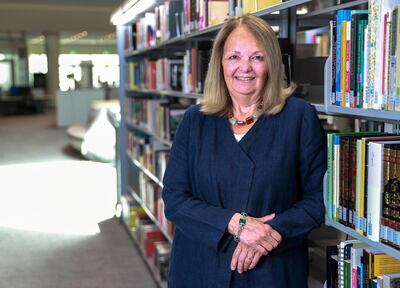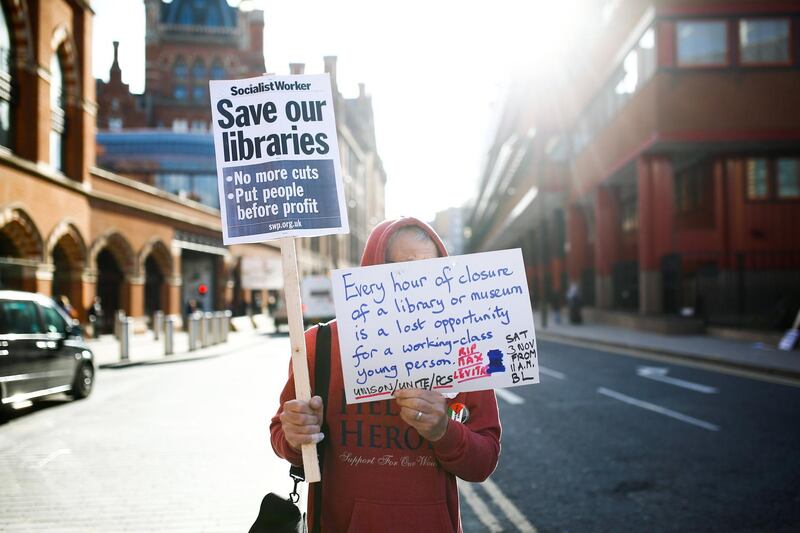I still have the library card my son used when he was about five years old. I kept it because of the childish letters scrawled across the back, where he laboriously spelled out his name. We got a lot of use from that little card before we moved to Abu Dhabi, seven years ago. We would go to the library every weekend and spend an hour or so browsing the shelves. There were even a few summers when my children entered the library's summer reading competitions, similar to the Arab Reading Challenge – albeit without the cash prize. Perhaps if there had been a financial incentive for those competitions, my children might have taken them more seriously, although probably not with the tenacity of this year's winner, nine-year-old Maryam Amjoun, who had to read at least 50 books in a year.
When we arrived in Abu Dhabi, however, the only lending library we had access to was the one in my children's school. There are now a handful of libraries across the emirate, including one in Khalifa Park, which houses thousands of titles in English and Arabic, and a new children's library set to open soon in the revamped Qasr Al Hosn. Back in 2011, however, our options were limited and that meant switching to a digital reading device.
We are now steady customers of Amazon, but I am increasingly resentful of the company's algorithm-based "you might like" suggestions. Amazon's chief executive Jeff Bezos would have us believe they are like having a personalised digital librarian, but we all know that they are based on sales: it's capitalism, not careful curation. Similarly, while book fairs in the UAE, such as the one currently taking place in Sharjah, pride themselves on promoting a love of reading first and foremost, many others around the world are about commerce as much as they are about enjoying books.

But even as the world of e-publishing presents a challenge to libraries, libraries also present the best line of resistance to digital domination. One of the joys of libraries is finding something unexpected. In those moments when you’re looking for one title and find something else wonderful by chance, you are creating your own algorithm – and for free. The more we rely on those “suggestions” from Amazon and other digital sites, the more our ability to browse can atrophy. Allowing ourselves the opportunity to make serendipitous book choices becomes an assertion of independence, a small digital revolution. We can decide ourselves what we might like without being told what we should like.
Of course, most of us have handheld devices that can hold multiple newspapers, encyclopedias and biographies, but so too does a library. On its shelves is the wisdom of the ages; the lives of saints and sinners; explanations of how to do everything from writing your own book to building a birdhouse or a boat. And a library’s battery never runs down. What we gain in portability from our e-readers, we’ve ceded to online retailers, in terms of both control and cash.

We pay for new books ordered online, swiftly discarded after we have read them, and forget that perhaps we would be better off if we instead supported neighbourhood libraries when we can. Increasing funding for libraries allows them to improve their services, which in turn boosts the number of patrons using them. Better funding also allows libraries to become digital providers, offering patrons free access to the internet and online tools that many people cannot afford or find elsewhere.
Increasingly, libraries are seen as anchors of their communities, even if borrowing books isn't always the primary reason that people use them. The fact that the renovation of Qasr Al Hosn will include a children's lending library speaks to this very idea. Books, both contemporary and centuries-old, will sit in the heart of Abu Dhabi, in the oldest building in the city, and be read many times over.
I hope the new library leads to more branches – places where people can come together in a space devoted to ideas, imagination and dialogue, without having to pay for the privilege. Librarians around the world have become staunch defenders of the idea of access, not just to books but to the digital world itself. In the European Union, libraries have even become involved in the refugee crisis, with the German Library Association putting out a statement that says “free access to education and training, to information and culture, is a fundamental right of all people". Librarians have also been a driving force to pressure the global publishing industry for more diverse books for children, including volumes in languages other than English.

It is funny to think that my son’s now-tattered library card offered him the key to such a powerful treasure trove. Libraries maintain the links to our intellectual and cultural heritage, but can also offer us a portal to the future through the technology that dictates so many of our choices. Find a library near you today, browse to your heart's content and resist the hegemony of the digital age.
Deborah Lindsay Williams is an associate professor of literature at NYU Abu Dhabi





